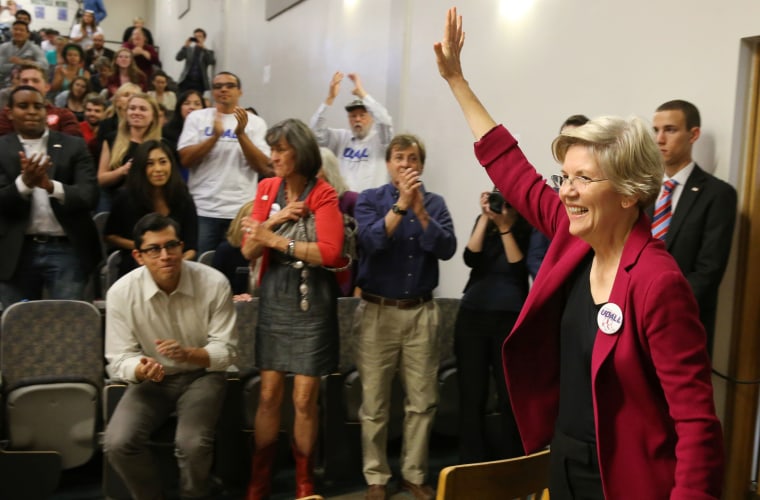Elizabeth Warren may be a populist, but her supporters include the elite.
That’s the takeaway from a new ABC News/Washington Post poll of the emerging Democratic presidential field, which suggests that supporters of the Massachusetts senator skew whiter, wealthier, more educated, and more male.
RELATED: The search for the next Barack Obama is on
Warren’s populist message has electrified activists and donors who want her to take on Hillary Clinton in 2016, even though the senator insists she’s not interested. So while Warren is unlikely to run, the data nonetheless offer a useful snapshot of the Democratic Party's self-described “Warren Wing,” which has become an important force in progressive politics.
The poll, released Sunday, shows that 11% of registered Democrats overall say they’d vote for Warren if the election were today. That’s just behind Vice President Joe Biden, at 13% — still miles away from Clinton's 64% — and pretty typical of most polls.
More interesting is the demographic breakdown. Warren outperforms among liberals, but she also does dramatically better with wealthier Democrats, those with college degrees, whites, and men.
The results are stark. Among those making more than $50,000 a year, 16% say they would support Warren if the Democratic primary were held today. Just 6% of those who make less than $50,000 say the same.
On racial lines, 16% of whites say they’d vote for Warren, compared to just 4% of nonwhites. Meanwhile, Warren captures 20% of college graduates, and just 5% of those who lack a degree. And she gets 14% of men, versus 7% of women.
Despite concerns that Clinton’s wealth might alienate her from working class voters, the former secretary of state’s support is actually 4 percentage points stronger among lower-income Democrats. She also does slightly better among nonwhites, those without college degrees, and especially women.
Biden’s numbers follow a similar pattern as Clinton’s.
And it’s not just this poll. In fact, the pattern is consistent across every one of the handful of surveys conducted in the past few months for which demographic breakdowns where available. A McClatchy-Marist poll from late September found that while Clinton’s support varied only a percentage point or two across these key demographic lines, Warren’s fluctuated more dramatically. That survey showed the senator receiving support from 15% of college graduates, compared to just 3% of those without degrees. She got 10% of respondents who make more than $50,000 a year, but only 5% who make less than that amount said the same.
The difference on gender was smaller than in the new poll, though men were more likely to support Warren than women by 3 percentage points. No breakdown on race was available.
RELATED: Ready for Warren gears up
In July, a CNN poll told a similar story. In that survey, Warren whites were four times more likely to support Warren than non-whites, 6% to 14%. She also got double the support from people making more than $50,000 a year (15%) as those who made less than the threshold (7%). And a larger portion of people who attended college (13%) supported her than those who did not (7%). The poll indicated that 12% of men said they would support Warren, compared to 9% of women.
Again, Clinton’s levels hardly budged depending income or education level, and neither did Biden’s. Just two percentage points separated her share of support from higher and lower income respondents, and education level made no difference in her share at all.
A separate ABC News/Washington Post poll from June again confirmed the pattern: 10% of those who make more than $50,000 supported Warren, compared to 5% under the threshold. And 11% of college graduates supported the senator compared 5% without a degree. And slightly more non-whites than whites lent their support. In that poll, however, women were more likely to support to Warren than men.
There are few important caveats to the data, which is coming in more than a year head of the Iowa Caucuses. Most importantly, all early polls tend to be skewed by name recognition. Candidates who are not yell known do poorly while famous ones do better, even if that doesn’t reflect the underlying level of support they may one day receive. It’s possible, for instance, that whiter, wealthier, and better educated Democrats are simply more likely to know who Warren is, since they’re might be more likely to consume political news. Clinton and Biden, meanwhile, are so universally known that that new consumption bias wouldn’t matter.
But the numbers do makes some intuitive sense. While Warren’s message is populist, her issues — banking regulation, campaign finance reform, structural economic inequality — are extremely complex, abstract subjects. It’s helpful to have a college degree to understand them. She’s successfully given these issues an emotional resonance for all voters who feel they’re not getting a fair shake, but it’s conceivable that educated people (who also tend to be whiter and wealthier) are just more likely to get fired up by Glass Steagall.
As for women, it's possible Clinton sucks up all the enthusiasm.
If the numbers hold, however, it also suggests a potential ceiling on Warren’s support — an ironic turn for a populist agenda.
